From Wikipedia:
Alan Civil OBE (13 June 1929 – 19 March 1989) was a British horn player.
Civil began to play the horn at a young age, and joined the famous Royal Artillery Band and Orchestra at Woolwich, while still in his teens. He studied the instrument under Aubrey Brain, father of Dennis Brain.
Civil was engaged by Thomas Beecham to play second horn to Dennis Brain in the Royal Philharmonic Orchestra, and when Brain left for the Philharmonia, Civil took over leadership of the section. In 1955, Civil joined the Philharmonia himself, becoming principal horn player when Brain died in a car crash in 1957.
In the 1960s, Civil became the first non-German to be approached by the Berlin Philharmonic Orchestra to become a member. Civil stuck with the Philharmonia however, who were reshaping themselves into the New Philharmonia. In 1966 he became principal horn of the BBC Symphony Orchestra, remaining there until his retirement in 1988.
As a soloist, Civil recorded the horn concertos of Mozart (with the Philharmonia, under Otto Klemperer, 1960), and his recording of Benjamin Britten’s Serenade for Tenor, Horn and Strings with Robert Tear is also quite well known. He also played chamber music in the Alan Civil Horn Trio.
As well as his work in classical music, Civil played the horn solo on The Beatles’ song “For No One” from the album Revolver and was one of only five session musicians to get a named credit on a Beatles recording. Civil was also part of the orchestra crescendo in the song “A Day in the Life” from the album Sgt. Pepper’s Lonely Hearts Club Band. Civil taught at the Royal College of Music. Among his pupils is Timothy Brown. He was appointed an OBE in 1985.
Civil died of liver and kidney failure on 19 March 1989 at King’s College Hospital in London. He was 59 years old. […]
Alan Civil played French horn on “For No One” and “A Day in the Life“.
George Martin rang me up and said ‘We want a French horn obligato on a Beatles song, can you do it?’ I knew George from his very early days at EMI because I’d been doing a lot of freelance work then. So I turned up at Abbey Road and all the bobbysoxers were hanging around outside and trying to look through the windows.
I thought the song was called ‘For Number One’ because I saw ‘For No One’ written down somewhere. Anyway, they played the existing tape to me, which was complete, and I thought it had been recorded in rather bad musical style, in that it was ‘in the cracks’, neither B-flat nor B-major. This posed a certain difficulty in tuning my instrument. Paul said ‘We want something there. Can you play something that fits in?’ It was rather difficult to actually understand exactly what they wanted so I made something up which was middle register, a baroque style solo. I played it several times, each take wiping out the previous attempt.
My friends would ask ‘What have you done this week?’ and I would say ‘Oh, I played with Otto Klemperer and Rudolf Kempe’ — that didn’t mean anything to them. But to say that you’d played with the Beatles was amazing. The day would almost go into their diaries as being the day they met someone who’d played with the Beatles. Even now, while only a few people come up to me and say ‘I do like your Mozart horn concertos’ so many others say ‘See that big grey-haired old chap over there? – he played with the Beatles!’. For me, it was just another day’s work.
Alan Civil – From The Complete Beatles Recording Sessions by Mark Lewisohn, 2004
George was in for the crack, he liked that. He said, ‘It’ll work, it’ll work.’ On the session Alan Civil said, ‘George?’ and looked at us both. He said, ‘George, you’ve written a D,’ and George and I just looked at him and held our nerve and said, ‘Yes?’ And he gave us a crafty look and went, ‘Okay.’ We did the same trick on ‘Penny Lane’ with David Mason on the piccolo trumpet, and he almost never forgave me for it because the only thing people ever asked him to do after that was high trumpet stuff.
Paul McCartney – From “Many Years From Now” by Barry Miles, 1997
Occasionally we’d have an idea for some new kind of instrumentation, particularly for solos. On ‘You’ve Got To Hide Your Love Away’, John had wanted a flute. On ‘For No One’ I was interested in the French horn, because it was an instrument I’d always loved from when I was a kid. It’s a beautiful sound, so I went to George Martin and said, ‘How can we go about this?’ And he said, ‘Well, let me get the very finest.’
That was one of the great things about George. He knew how to obtain the best musicians and would suggest getting them. On this occasion he suggested Alan Civil, who, like all these great blokes, looks quite ordinary at the session – but plays like an angel.
George asked me, ‘Now, what do you want him to play?’ I said. ‘Something like this,’ and sang the solo to him, and he wrote it down. Towards the end of the session, when we were getting the piece down for Alan to play, George explained to me the range of the instrument: ‘Well, it goes from here to this top E,’ and I said, ‘What if we ask him to play an F?’ George saw the joke and joined in the conspiracy.
We came to the session and Alan looked up from his bit of paper: ‘Eh, George? I think there’s a mistake here – you’ve got a high F written down.’ Then George and I said, ‘Yeah,’ and smiled back at him, and he knew what we were up to and played it. These great players will do it. Even though it’s officially off the end of their instrument, they can do it, and they’re quite into it occasionally. It’s a nice little solo.
Paul McCartney – From “The Beatles Anthology” book, 2000
Paul didn’t realise how brilliantly Alan Civil was doing. We got the definitive performance, and Paul said, ‘Well, OK, I think you can do it better than that, can’t you, Alan?’ Alan nearly exploded. Of course, he didn’t do it better than that, and the way we’d already heard it was the way you hear it now.
George Martin – From “The Beatles Anthology” book, 2000
Another memorable incident occurred when Alan Civil — formerly of the London Philharmonic and then the principal horn player of the BBC Symphony Orchestra — was brought in to add French horn to Paul’s haunting song ‘For No One.’ Alan was under a lot of pressure doing that overdub, because it was so hard to hit the high note in the solo. In fact, most people would have never written that part for a French horn player because it was too high to play, but that was the note Paul wanted to hear, and so that was the note he was going to get. […] Alan was reluctant to even try it; he was actually breaking out into a sweat, telling everyone it really shouldn’t be done. But eventually he gave it a go and pulled it off.
Though Alan was a wreck by the time he left that session, he was well pleased with what he’d done, because it was the performance of his life. In fact, he became a star in his own right because of that, but the problem was that, from that day on, arrangers would expect other horn players to be able to do what he had done, and they were often disappointed if they gave the parts to other players of lesser ability.
Geoff Emerick – From “Here, There and Everywhere: My Life Recording the Music of The Beatles“, 2006
Even now, while only a few people come up to me and sayd, “I do like your Mozart horn concertos,” so many others say, “See that big grey-haired old chap over there? He played with The Beatles!” For me, it was just another day’s work, the third session that day in fact, but it was very interesting.
Alan Civil – Horn player – 1988 interview – From “Revolver (2022)” book
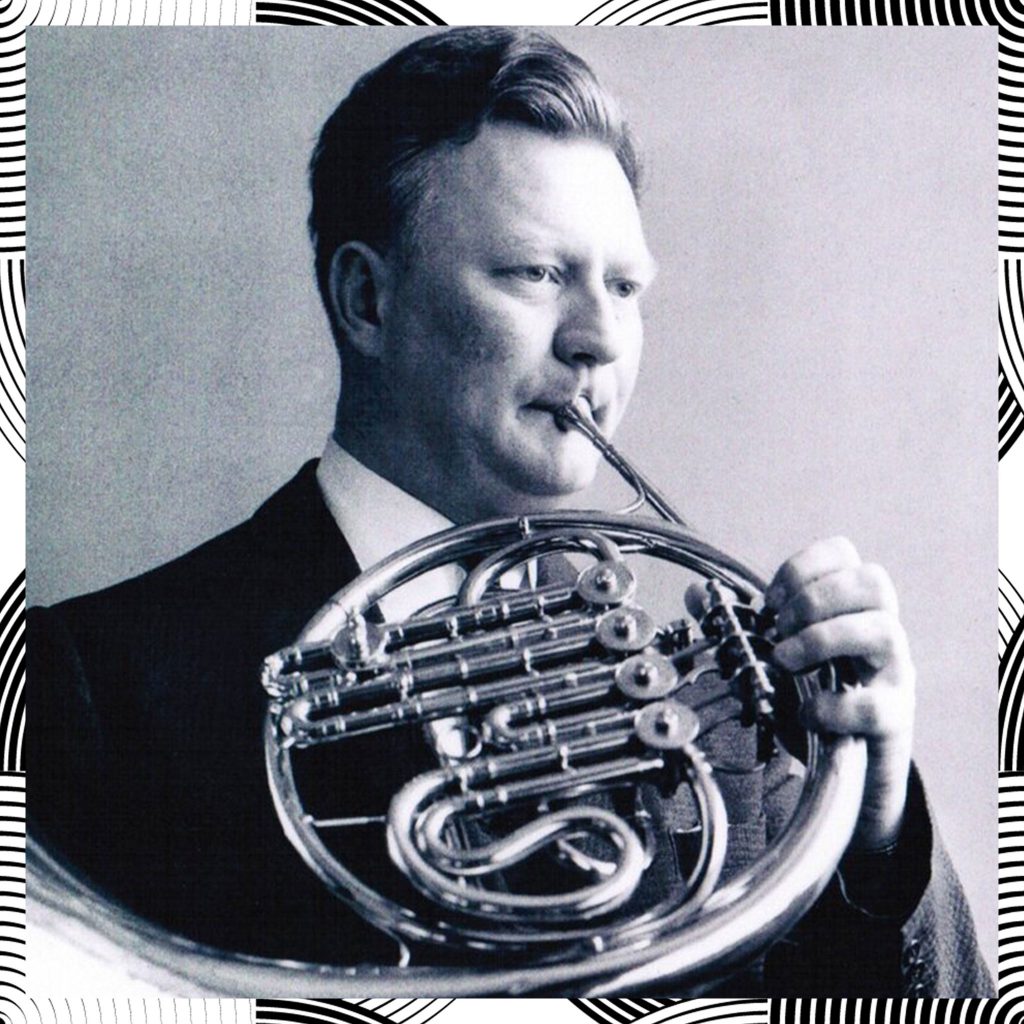
The orchestra overdubs for “A Day In The Life” were recorded on February 10, 1967. The Beatles decided to use a symphony orchestra to fill the 24-bar gap between the two sections of the track. To allay concerns that classically trained musicians would not be able to improvise the section, producer George Martin wrote a loose score for the section. It was an extended, atonal crescendo that encouraged the 40-piece orchestra to improvise within the defined framework.
Paul McCartney had the idea to turn this unconventional session into a sort of happening. The musician were asked to attend in full evening dresses and were given accessories like red false noses, flowery paper spectacles or large gorilla paws…
In addition, the session was filmed for use in a planned television special. But given the BBC’s ban of “A Day In The Life“, because of what they assumed were drug references, the idea was abandoned. In 2015, portions of the film were released in the “A Day in the Life” promotional film, included in the three-disc versions of the Beatles’ 2015 video compilation 1+.
The orchestra and George Martin had been asked to attend in full evening dress, which the Beatles also promised they would wear. The Beatles did not keep their word but the orchestra and George Martin looked very smart in their tuxedos. In order to get them into the mood to play something unconventional and to encourage in them an element of playful spontaneity, the Beatles went among the players handing out party favours. Mal Evans had been sent to a joke shop on Great Russell Street and returned with plastic stick-on nipples, plastic glasses with false eyes, rubber bald pates, some with knotted handkerchiefs balanced on them, huge fake cigars, party hats and streamers: David McCallum, the leader of the London Philharmonic, wore a large red false nose; Erich Gruenberg, the leader of the second violins, had on a pair of flowery paper spectacles and held his bow in a large gorilla paw; the bassoon players, Alfred Waters and N. Fawcett, had balloons attached to their instruments which inflated and deflated with each note, raising a laugh from George Martin.
From “Paul McCartney: Many Years from Now” by Barry Miles, 1997
And if that wasn’t unorthodox enough, they were even more bemused, if not downright aghast, by Paul’s instructions that they all play as out of tune and out of time as possible. This twist was added during the taping of “A Day In The Life”‘s cosmic crescendo, for which Paul had assumed – with obvious relish – the role of “conductor.”
Pete Shotton – From “The Beatles, Lennon, And Me“, 1984
It was quite a chaotic session. Such a big orchestra, playing with very little music. And the Beatle chaps were wandering around with rather expensive cameras, like new toys, photographing everything.
Alan Civil – Horn player – From “The Complete Beatles Recording Sessions” by Mark Lewisohn, 1988
Only the Beatles could have assembled a studio full of musicians, many from the Royal Philharmonic or the London Symphony orchestras, all wearing funny hats, red noses, balloons on their bows and putting up with headphones clipped around their Stradivari violins acting as microphones.
Peter Vince, studio engineer – From “The Complete Beatles Recording Sessions” by Mark Lewisohn, 1988
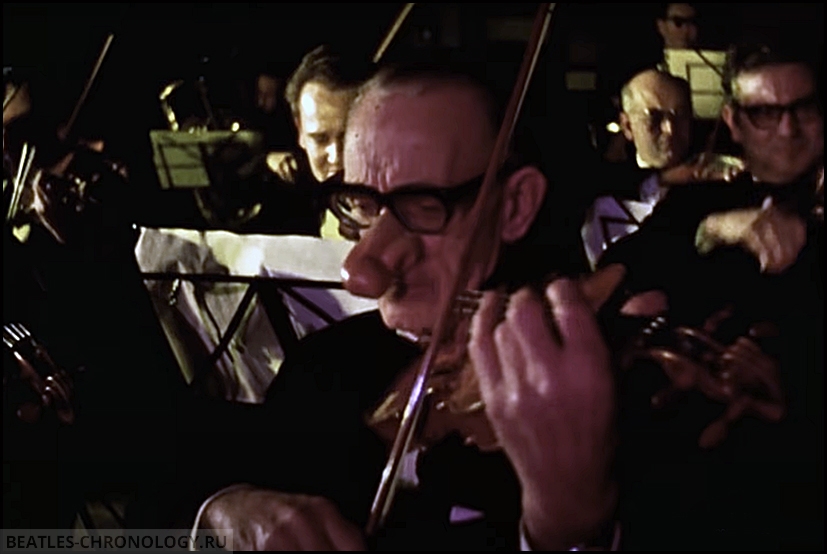
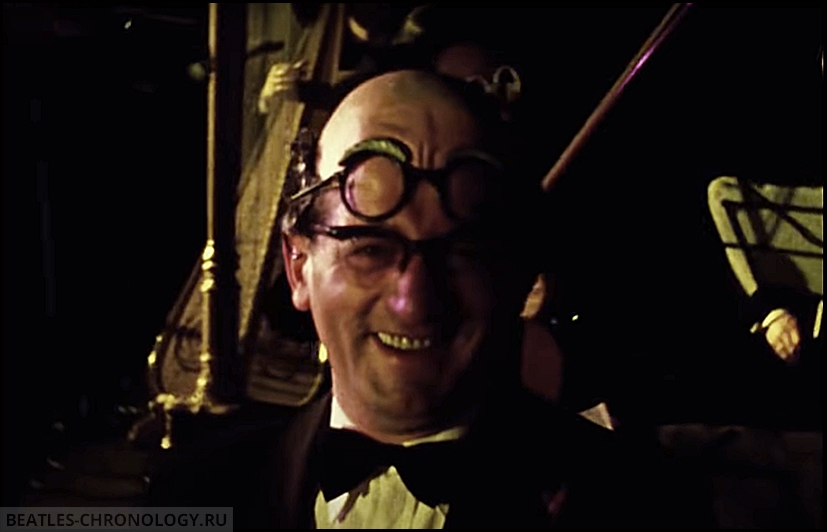
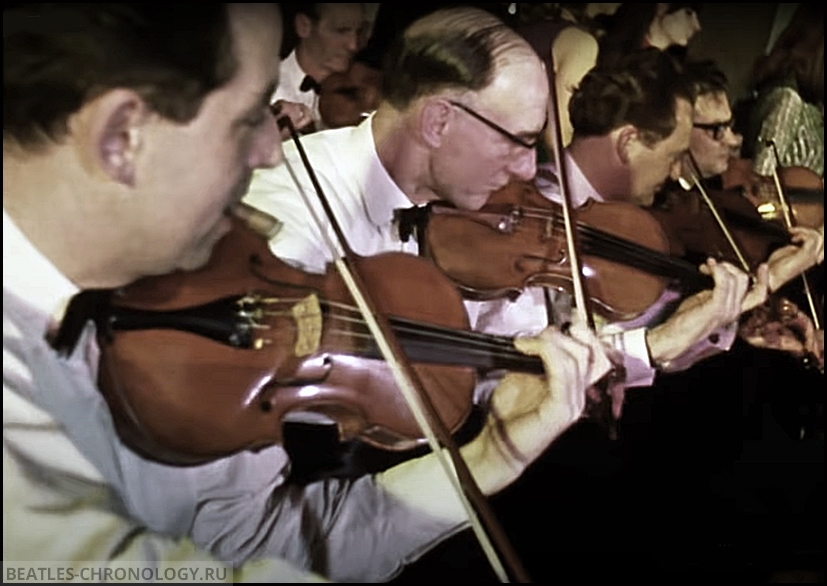
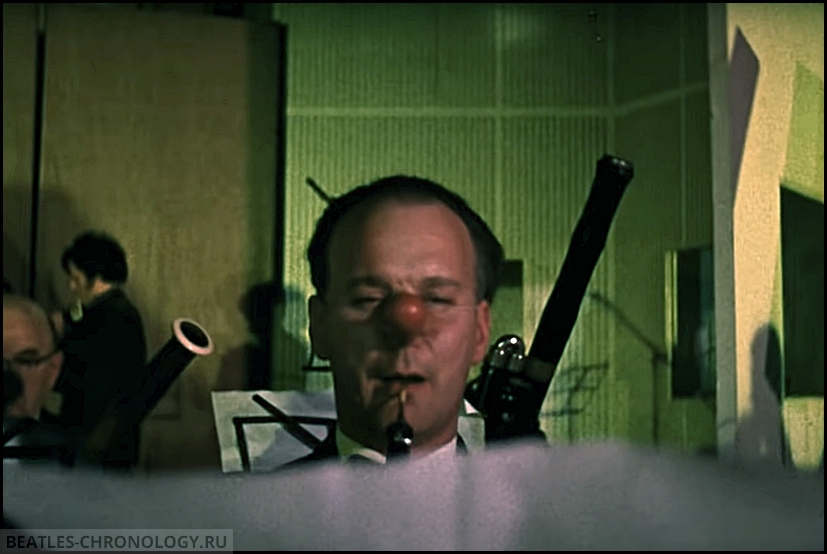
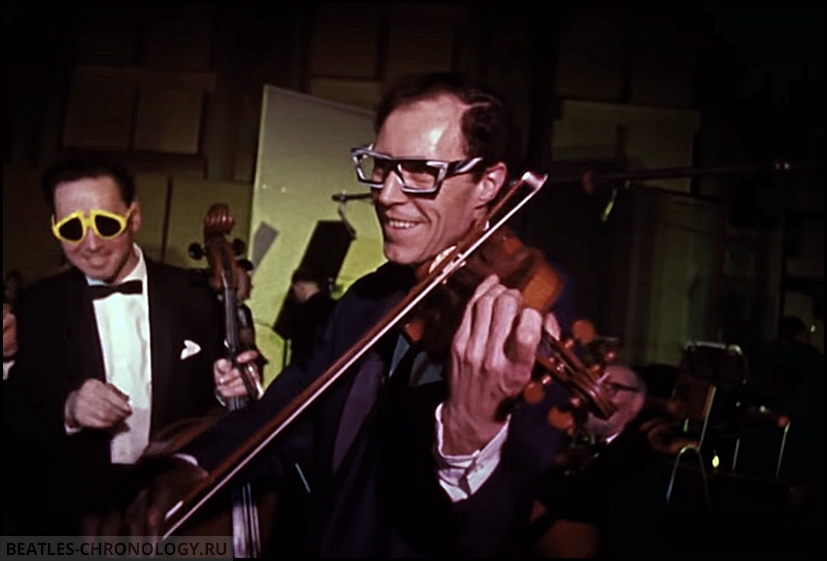
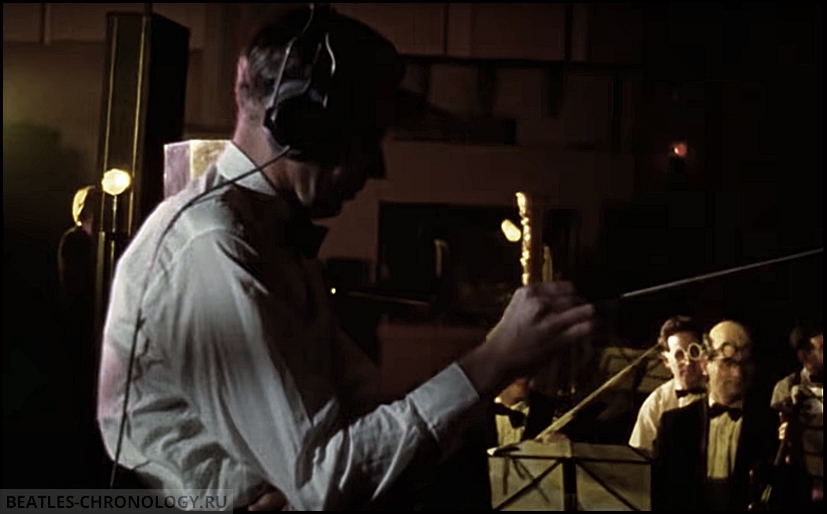
May 19, 1966 • Songs recorded during this session appear on Revolver (UK Mono)
Recording "A Day In The Life" #4
Feb 10, 1967 • Songs recorded during this session appear on Sgt. Pepper's Lonely Hearts Club Band (UK Mono)

Notice any inaccuracies on this page? Have additional insights or ideas for new content? Or just want to share your thoughts? We value your feedback! Please use the form below to get in touch with us.